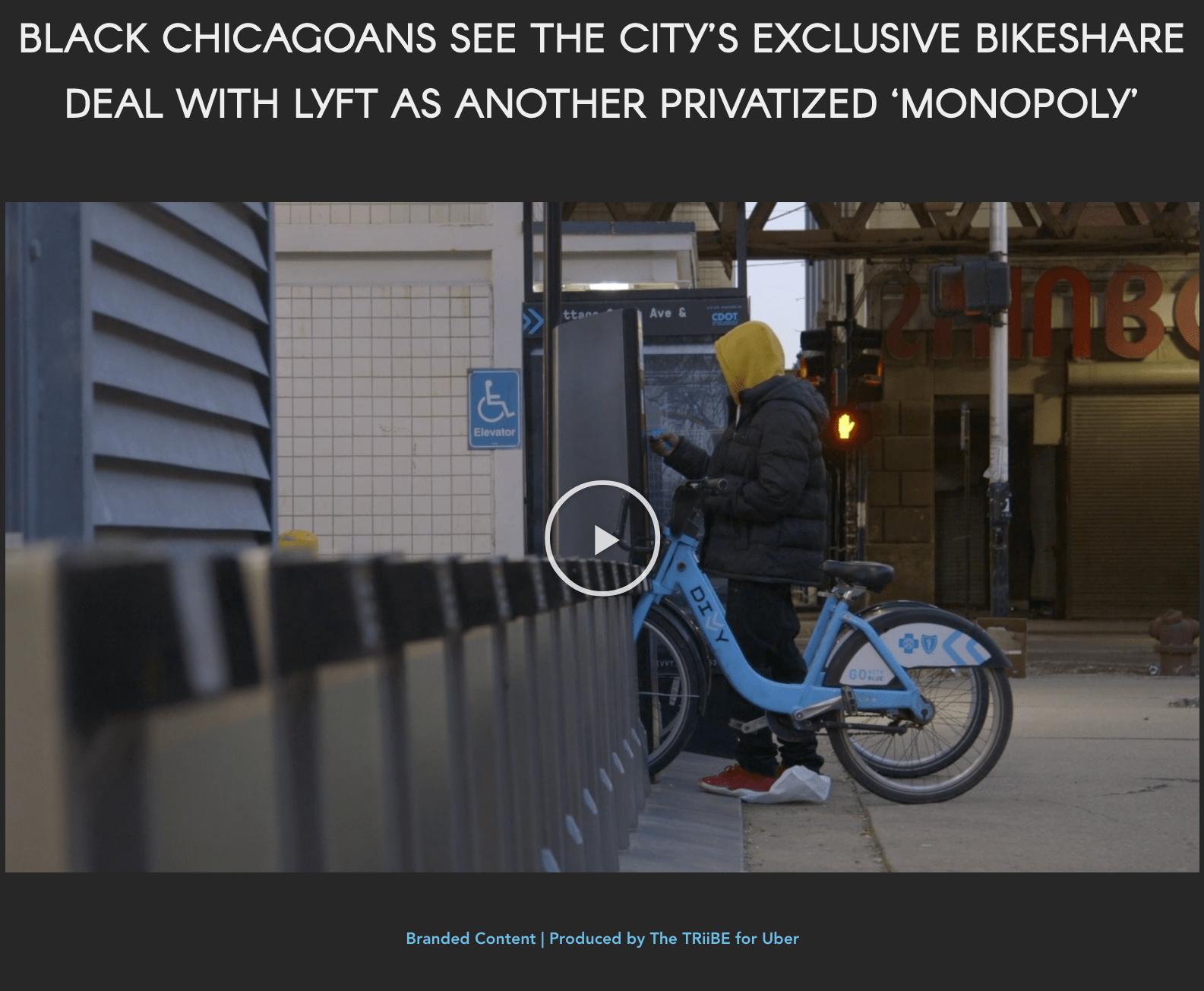The proxy war between ride-share giants Uber and Lyft over the future of Chicago bike-share has been heating up. Uber recently paid for coverage on the local news and culture website The TriiBE promoting its anti-Lyft/Divvy deal agenda. And today a press conference was held at City Hall today, with South and West Side leaders speaking out against the planned deal, although they say they have no connection to Uber.
Tomorrow the city's Pedestrian and Traffic Safety Committee will hold a hearing on Chicago's proposed contract amendment with Divvy concessionaire Lyft, which would expand the bike-share system citywide, and add 10,500 cycles by 2021, nearly tripling the fleet. Lyft would spend $50 million on the hardware and the city would get an additional $77 million in revenue during the remaining nine years of the existing contract. In return, Lyft would be designated Chicago's exclusive bike-share operator.
The hearing takes place at 11 a.m. in City Hall Room 201 A and is open to the public. If the deal passes at the next committee meeting on April 8, noon, in the same room, the full City Council will vote on it on April 10, about a month before Mayor Rahm Emanuel leaves office.
However, Uber, which owns the dockless bike-share company JUMP, says it made a pitch to the city in December to deploy 20,000 bikes by May. (Chicago Department of Transportation chief Rebekah Scheinfeld called that timeline "laughable.") Uber also claimed it would spend $200 million over five years on bike infrastructure, which would be increased to a whopping $450 million investment if Uber was given the bike-share monopoly.
Uber recently launched an ad campaign and the website PumpTheBrakesChicago.com, which contains a number of misleading and false statements about the Lyft/Divvy deal. For example it implying that if Uber won the franchise, Chicago would get $450 million without having to give Uber a monopoly.
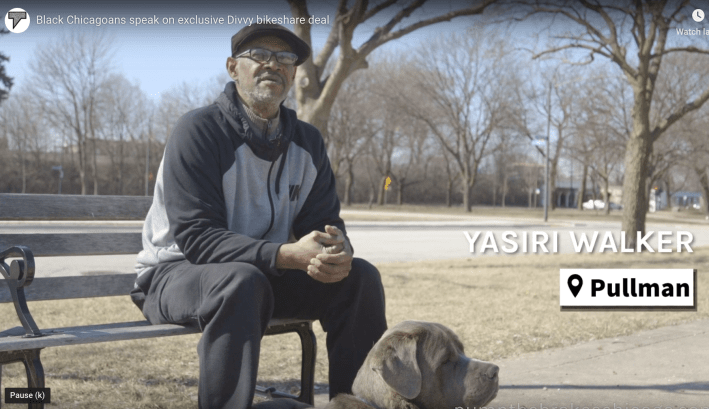
Today I learned that Uber paid the TheTRiiBE, which describes itself as "a digital media platform showcasing innovative content to reshape the narrative of Black Chicago," to present its anti-Lyft talking points to residents on the South and West Sides, and produce a news-report-style article and video featuring their responses. The TRiiBE piece and video were published yesterday, with the statement "Branded content produced by The TRiiBE for Uber."
Editor-in-chief Tiffany Walden declined to comment about the website's relationship with Uber for this post.
The TRiiBE coverage is well written and filmed, and it's great to see South and West side residents being asked their opinions about a transportation and equity issue. All Chicagoans should have agency to help make decisions about what's best for their communities.
However, it's important to ensure that residents are provided with good information when they're forming their opinions. Instead, Uber paid The TRiiBE to present the bike-share issue to the residents in a way that favored the company's position.
The video shows residents being asked somewhat leading questions about the Lyft/Divvy deal such including "Is an exclusive deal with Lyft beneficial to the South and West sides?" and "Should city allow Lyft and Uber to operate bikes at the same time?" and "Do you think there are enough bikes on the South and West Sides." Unsurprisingly, all of the featured interviewees say they're opposed to the Lyft deal and want Uber to bring more bikes to their communities.
“I had not heard about the [Lyft/Divvy] deal," says Roseland resident Tira McBride. "It doesn’t seem fair that one company is going to be able to monopolize [Chicago’s bikeshare] industry.” She adds that the contract amendment sounds similar to Chicago's hated parking meter deal.
West Side resident Charles Brace compares the Divvy/Lyft deal to the Chicago Skyway privatization contract. “I don’t agree with it,” he says. Nowhere in the coverage is it mentioned that Uber also sought to be Chicago's exclusive bike-share provider.
The TRiiBE piece also states that the Uber deal "was valued at $450 million" compared to the total of $127 million for Chicago from the Lyft deal, but it doesn't mention that without exclusivity Uber would only spend $200 million.
The article also quotes Robert Kellman, Uber’s global head of government affairs and policy for bike-share arguing that the Lyft deal would hurt the South and West sides, but it doesn't include a response from Lyft. “We’re simply asking them to make [the city’s bike-share contract] non-exclusive so that any company that wants to invest in the South and West sides is able to do so,” Kellman says. Again, Uber was also seeking an exclusive contract. He encourages residents to contact their aldermen and tell them they oppose the Lyft deal.
The accompanying video is essentially a lobbying ad, including captions that state Uber's talking points, such as "By approving the exclusive, no-bid [Lyft/Divvy] contract..."
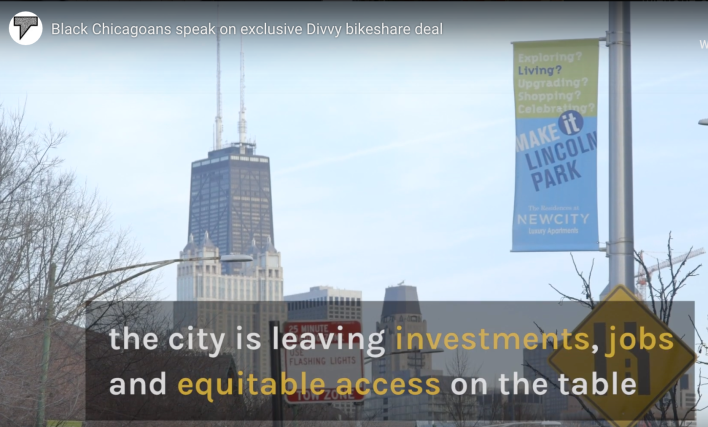
The TRiiBE has tweeted out its Uber-friendly coverage at least six times since yesterday. Some of the tweets mention that the content was "produced by The TRiiBE for Uber," but others, such as the one below, don't disclose that Uber is paying for the positive press.
First the Skyway.Then the parking meters.Now the Divvy bikeshare system.
Black Chicagoans see the city's deal to make Lyft the sole operator of Divvy bikes as another monopoly that will raise prices & hurt us.
City Council will vote on this on April 10. pic.twitter.com/iXvZY1bAa3
— The TRiiBE (@TheTRiiBE) March 27, 2019
As the editor of an independent news website myself, I know it can be challenging to keep such a publication afloat, so I don't blame The TRiiBE for taking Uber's money. Streetsblog Chicago also runs sponsored posts like this one, although we don't allow sponsors, advertisers, and donors to shape our editorial content.
But buying good press to influence Chicago bike-share policy seems like a shady tactic on Uber's part. They could have easily produced and disseminated their own press release and video to make their arguments, without trying to pass off PR materials as news coverage.
Meanwhile, today at City Hall South and West Side community leaders held a press conference that also compared the Lift/Divvy deal to the parking meter contract and argued that Lyft's longer timeline for citywide expansion would be inequitable. (City officials have stressed that while the meter deal sold off an existing resource for 75 years, the Lyft deal would add thousands of new bikes and only lastsfor nine years.) But unlike the anti-Lyft messages in the The TRiiBE coverage, press conference participants say Uber wasn't involved in the planning.
Tim Jones, a Hyde Park-based community advocate, told me he organized the event. Other participants included 20th Ward aldermanic candidate Reverend Andre Smith; former 7th Ward aldermanic candidate Jedidiah Brown; K.L.E.O. Center executive director Lesle´Honore´; Donna Hampton Smith, president and CEO of the Washington Park Chamber of Commerce; and Ashlee Renee Evans from the Chatham Business Association.
“The city should reject exclusive contracts that only benefit a single company and are not in the best interests of all Chicago neighborhoods," said Reverend Smith at the event, according to a Sun-Times report. "Unfortunately, what we are witnessing now is the city striking a no-bid, backroom deal with Lyft-owned Divvy that gives Divvy a monopoly over all bike-share programs in the city with no expansion to the South and West Side for over two years.”
Some of that language, as well as the text on signs at the event, was similar to phrases on Uber's Pump the Brakes website, which refers to the contract amendment as "a no-bid" "backdoor deal" with Divvy.
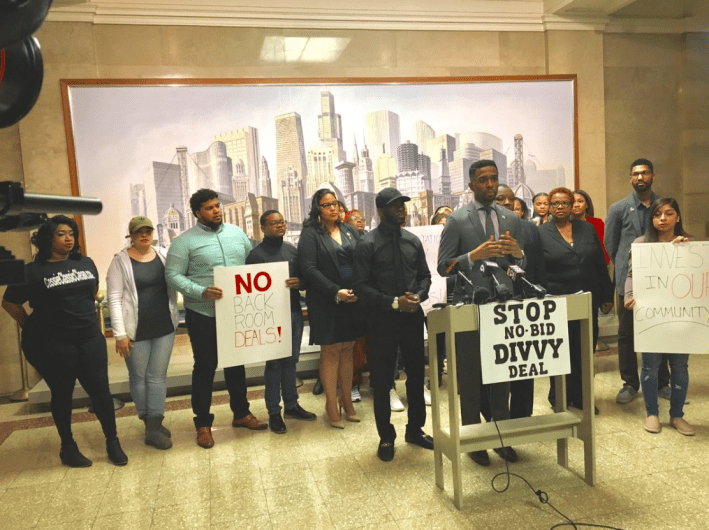
Tim Jones told me the similarity between the participants' talking points and Uber's is due to him checking out the Pump the Brakes website of his own accord -- he said he hasn't been in touch with Uber. "I'm just a concerned citizen, concerned about equity on the South and West Sides and all over the city," he said. "I follow the news like everyone else and I saw an opportunity being left on the table. Why not let everybody invest on the South and West Side?"
Tim Brown said he wasn't personally acquainted with all the participants, but had connected with them via organizations like the Black Leadership Council. When I reached Jedidiah Brown, he said he didn't remember the press conference organizer's name. He added that he hasn't been in touch with Uber.
"I heard about the issue from some media outlet and I was like, OK this isn't cool," Jedidiah Brown said. "This is the kind of thing I ran against in my aldermanic campaign... I'm just trying to make sure the city diversifies its portfolio and doesn't make any bad deals."
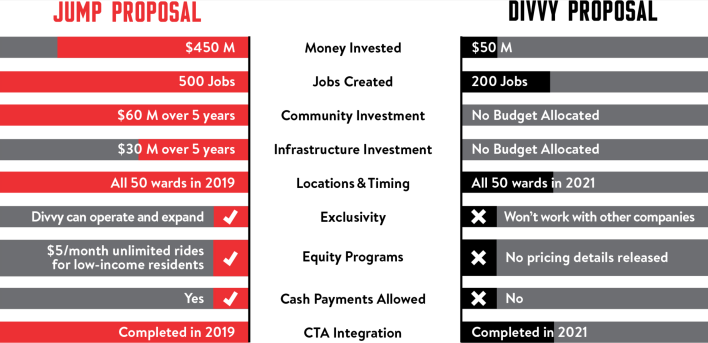
When I asked Tim Brown about the details of the competing Lyft and Uber offers, it turned out that he had a few misconceptions, which reflected misleading or incorrect statements on the Pump the Brakes website. For example, he wasn't aware that Uber wouldn't spend $450 million unless it got a monopoly. Also, thanks to the above chart, he was under the false impression that Divvy doesn't offers discounted memberships for low-income residents or a cash payment option. In reality, $5 Divvy for Everyone annual memberships, which can be paid for with cash, have been available for 3.5 years.
But Tim Brown said that he didn't see the misinformation on the website as being a major issue."We don't really care about those details. We just want to see more community investment on the South and West sides."
Uber and Lyft didn't respond to requests for comment for this article.
